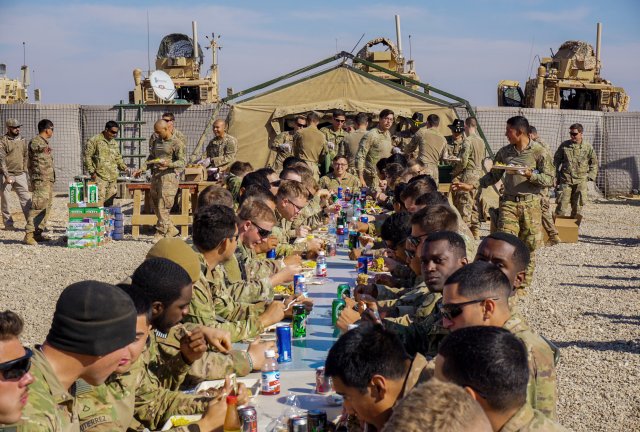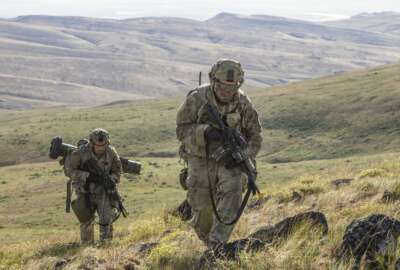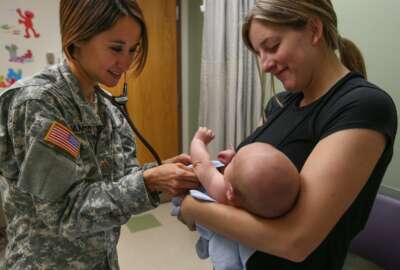Army implements sweeping parental, pregnancy, postpartum policies
The new Army directive brings together a group of decentralized policies and adds six new ones for soldiers.
When Army Staff Sgt. Nicole Pierce had a miscarriage in 2016, she had two days to grieve and recover from surgery before she needed to be back on duty.
“I ended up asking my doctor, ‘Hey, can I get a little more time? You know, I just lost my child. My whole life just changed before my eyes. Can I have a little more time?’” Pierce told reporters Thursday during a roundtable.
Her request was denied. Pierce ended up taking two weeks of chargeable leave to “mourn the loss of my family and the future that I thought I was going to have.”
Now, six years later, thanks in part to a grassroots effort from soldiers around the country, the Army is issuing a sweeping directive that gives new privileges to soldiers who are parents, pregnant or postpartum.
“Pregnancy is not a unhealthy negative malady,” said Amy Kramer, special assistant to the undersecretary of the Army. “It is a healthy natural life event that should be celebrated. That’s part of our effort to normalize parenthood – expanding one’s family is natural; it is healthy. When our female warriors undergo such a life event, they shouldn’t be treated like they’re sick. They should be celebrated as we have one more member of the Army team, and what can we do to ensure that she is supported and can continue to fulfill the oath that she pledged years earlier? The same applies to adoptive parents and all parents.”
The directive brings together a group of decentralized policies that were either de facto implemented or were only applicable in certain areas of the Army. It also adds in six new policies for soldiers, five of which come from soldier feedback.
The policies include benefits for soldiers like Pierce after losing a child. Those soldiers will be given convalescent leave for emotional and physical recovery. That leave will be non-chargeable. Soldiers whose spouses went through a miscarriage will also be granted convalescent leave.
The leave can vary from seven to 42 days depending on when in the pregnancy the child was lost.
The policy also removes a requirement for soldiers to get pre-approved leave to terminate a pregnancy and grants those soldiers convalescent leave as well.
The directive changes training and education requirements for expecting soldiers and new parents. Postpartum soldiers will have a year to defer professional military education without effecting their promotions.
Lactation accommodations will be provided in education facilities and all soldiers will be exempt from physical fitness standards at educational facilities for a year.
Pregnancy will not disqualify a soldier from graduating a school and schools will be more accommodating to absences for soldiers who get pregnant during a course.
One area of contention in the service was the body composition test, postpartum soldiers will be exempt from that test for a year as well.
The concern is that women were forced to change their bodies in ways that were not healthy for the production of breastmilk or for recovery.
Another large change is that the Army is allowing birth parents and non-birth parents from any component to defer operational training for a year. That helps keep at least one parent home with the child at all times.
“We recognize that traditional male/father, female/mother – that’s not so traditional anymore,” said Lt. Col. Kelly Bell, an Army nurse who advocated for changes to policies. “You have single parents, you have single mothers, single dads, but you also have same gender couples who use fertility treatment if they’re female, or on the male side adopting. You have transgender soldiers, so this directive really is all inclusive of all parents seeing, and that is super exciting.”
The policy allows soldiers to wear maternity clothes up to a year after giving birth as well.
Kramer said the changes will have minimal negative effects on readiness and that only 0.6% of the Army is pregnant at any given time.
“But for the 180,000 women in uniform and for the 400,000 parents in the Army at some point in their careers, they will be affected by one or more of the policies in this directive,” she said. “That’s the long term investment in readiness.”
Copyright © 2024 Federal News Network. All rights reserved. This website is not intended for users located within the European Economic Area.
Scott Maucione is a defense reporter for Federal News Network and reports on human capital, workforce and the Defense Department at-large.
Follow @smaucioneWFED






